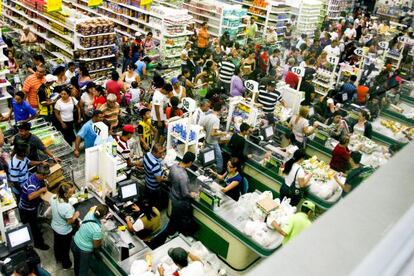Maduro hits at the root of anti-government protests
Police are called in to remove barricades in Venezuela’s western Táchira state

In an effort to try to stem the tide of recent anti-government demonstrations, President Nicolás Maduro ordered national police to unblock roads in Venezuela’s western Táchira state where students and other protestors have set up barricades over the past three weeks.
Specifically, Maduro ordered security forces to ensure the free flow of traffic in San Cristóbal, the state capital, and neighboring Táriba.
Táchira is the birthplace of the current wave of nationwide anti-government protests, which ignited in early February when students at the University of the Andes in San Cristóbal took to the streets to protest deteriorating security after the attempted rape of a female student on campus. It brought the opposition into action, whose leaders organized large marches across Venezuela on February 12 to demand Maduro step down because he has been unable to provide better measures to tackle crime and solve the food-shortage crisis, as well as being unwilling to let up on the repression against students and the opposition.
A strong government force on Monday took up positions in Táriba, a colonial town situated in the Andes near Táchira. The roadblocks set up by protestors have made life in Venezuela’s Andean region much slower than normal, making it more difficult for locals to get from one place to another.
But there are two sides to the story behind the violent events that occurred on Monday. Earlier in the day, residents fed up with the barricades decided to begin removing them on the road connecting San Cristóbal and the nearby town of La Fría. In the distance, explosions and gunshots were heard while a group of motorcyclists began revving their engines. Some vehicles were set on fire, and a group of journalists from Spanish state broadcaster TVE were taken by an unknown group of people and held inside a building.
Residents fed up with the barricades decided to begin removing them
Authorities refused to rescue the reporters after residents in the building began throwing rocks and bricks from the upper floors. The crew was later released.
But the government took advantage of the chaos to free up the roads and streets.
Táchira state governor José Gregorio Vielma Mora, who is a member of Maduro’s Socialist Party, has warned demonstrators that the roadblocks were creating massive food shortages because delivery trucks have been unable to reach supermarkets and other distribution points.
By nightfall, government troops tried to take an opposition stronghold neighborhood in San Cristóbal. While some barricades were removed, the students held their ground while the police withdrew their troops.
Governor Vielma said the police would be called out on to the streets again on Tuesday to ensure public transportation is operating properly.
It isn’t surprising that Táchira has become a hotbed of resistance. Last year, residents, who are affectionately known as “gochos,” came out heavily in support of opposition candidate Henrique Capriles in last April’s presidential elections. “Welcome to the ‘gocho’ resistance,” said Wilmer Ramírez, a well-known sports journalist in the state.
It isn’t surprising that Táchira has become a hotbed of resistance
The term, which is also used by Venezuelans to describe the non-conventional, independent nature of those who live in the Andes, is also applied to the natives of nearby Mérida and Trujillo states. Some Venezuelans find humor in the characterizations, which they also connect to some of the controversial historic leaders who were born in that region.
It was from here that Cipriano Castro rose to power at the end of the 19th century to initiate his so-called Liberal Restoration Revolution. Venezuela’s cruelest dictator, Juan Vicente Gómez, who ruled from 1908 to 1935, and Marco Pérez Jimenez, the country’s last dictator who governed from 1948 to 1958 and died in exile in Madrid in 2001, were also from this region.
Since the protests began, opposition forces and students have been working together to resist any attempt by the government to break their solidarity. In fact, neighbors have allowed medical interns and nurses loyal to the cause to use their homes to treat the injured so that they can avoid arrest if they are taken to the hospital.
The government is fully aware of this strategy, but the political cost for Maduro would be high if he tries to send in troops to raid these makeshift clinics.
The protests in San Cristóbal have grown from a student-run operation to a mass movement involving all social classes in the Andean city. San Cristóbal Mayor Daniel Ceballos said the Maduro government has not been able to understand what these uprisings are all about.
“These protests are not organized by paramilitaries, nor are they being organized by the sons of Álvaro Uribe,” Ceballos said in reference to the former Colombian president, whom Maduro has accused of having a hand in the unrest. “They are being led by citizens who are tired of shortages, the lack of security and the economic policies of the government.”
Tu suscripción se está usando en otro dispositivo
¿Quieres añadir otro usuario a tu suscripción?
Si continúas leyendo en este dispositivo, no se podrá leer en el otro.
FlechaTu suscripción se está usando en otro dispositivo y solo puedes acceder a EL PAÍS desde un dispositivo a la vez.
Si quieres compartir tu cuenta, cambia tu suscripción a la modalidad Premium, así podrás añadir otro usuario. Cada uno accederá con su propia cuenta de email, lo que os permitirá personalizar vuestra experiencia en EL PAÍS.
¿Tienes una suscripción de empresa? Accede aquí para contratar más cuentas.
En el caso de no saber quién está usando tu cuenta, te recomendamos cambiar tu contraseña aquí.
Si decides continuar compartiendo tu cuenta, este mensaje se mostrará en tu dispositivo y en el de la otra persona que está usando tu cuenta de forma indefinida, afectando a tu experiencia de lectura. Puedes consultar aquí los términos y condiciones de la suscripción digital.








































